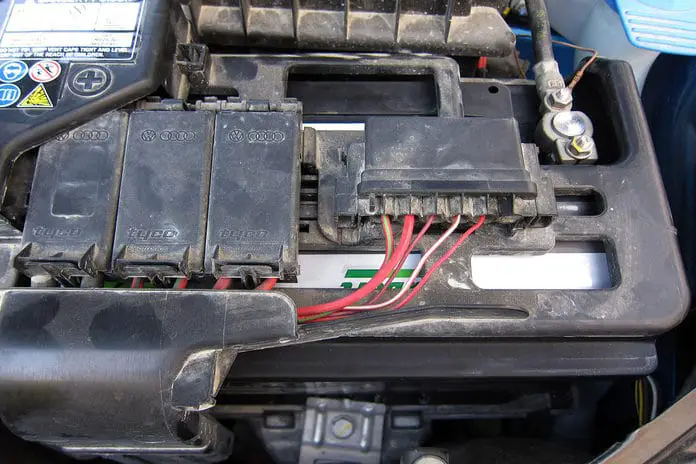
Recognizing the symptoms of a bad car battery is something that all car owners should know. Don’t get caught flat-footed, be aware of the signs before it’s too late. A battery going flat or dying is inevitable. Like everything else in this imperfect world, batteries don’t last forever, but its life and usefulness can be prolonged with proper care and attention.
What are the signs of a dead car battery? One sure sign of a dead car battery is an engine that won’t start. There are other signs of course, but a dead engine is the most convincing evidence of a battery that has gone flat or has died. Of course, an engine that won’t start could also be due to the malfunction of other engine parts like a defective alternator, but the most common cause is a dead car battery.
Here Are 5 Signs And Symptoms Of A Flat Car Battery
1.Slow cranking
There are times when the engine will start, but this is after several attempts of cranking it.
2.The engine cranks but won’t run
This is a case where your engine cranks when you turn the key, but refuses to run. There could be other causes of such a plight such as lack of fuel or a worn starter, but 98% of the time, the culprit is a weak or flat battery.
3. The engine won’t crank and start and the lights are off
A situation where your engine refuses to crank and start and the lights (headlights, dome lights, etc) won’t turn on is a clear indication that your battery is in trouble. When the alternator is not in operation, the battery powers your electrical system. If aside from an engine that does not turn over, you also can’t turn on your lights, you better have your battery check. It might be crying out already for a replacement.
4. Recurring starting problem
One morning, your engine starts with one click, the next morning it takes several attempts to crank it, the next day everything is fine again. But, two days after it happens again, the car refuses to start. A recurring starting problem is a sign that your battery is being drained during the night by a parasitic draw.
A parasitic draw or drain is a continuous drain on a battery’s power even when the engine is shut off. This could be caused by lights (trunk lights, signal lights, headlights, hood lights or globe box lights) that do not turn off when you close the car door. Other causes of a battery drain are bad diodes of the alternator and grounded relay switches. A parasitic drain can render your battery dead.
5. “Check Engine Light” warning signal is lit
When the “Check Engine Light” icon on your dashboard lights up, this could be another sign of a weak or failing battery.
These signs and symptoms may just be warning signals. Your battery may not yet be completely dead, but it’s getting there.
Why Do Batteries Die?
You know that batteries die, but do you know why? There are a number of reasons why batteries die, but the sure sign of death is when the battery plates’ active material is no longer able to deliver a discharge current which could be due to the following:
Age
The normal cause of death of a battery is age. Batteries are assigned a lifespan of from three to five years. Under normal conditions, a battery will already show signs of aging on or after its third year.
Because of the regular contraction and expansion of the plates during the discharge and charge cycle, the active positive materials of the plates flake off causing the battery to “age” or lose some of its capacity. The flakes form into a sludge that settles at the bottom of the battery case. This sludge or mud can short out the plates of a cell and when it happens, it could kill the battery.
Heat, deep discharges, fast charging, vibration and overcharging also stimulate the aging process.
Loss of water
A major cause of a battery’s premature death is the loss of water either from poor maintenance evaporation, overcharging and under hood heat. This is the reason why the electrolyte of car batteries, the wet or flooded lead-acid battery type, should be checked and refilled with distilled water regularly, as part of its routine maintenance.
Sulfation
Sulfation is a sure killer of batteries. It is an accumulation of lead sulfate crystals on the cell’s plates. Although it is acknowledged that all lead-acid batteries will develop lead sulfate crystals in their lifetime, the sulfate buildup is hastened by several factors.
One main cause of an accelerated buildup of sulfate is when batteries are undercharged or deprived of a full charge frequently. Overcharging or being left discharged for a number of days also hasten sulfate development.
Storing or using batteries in an above 75°F temperature speeds up self-discharge rate and dramatically increase sulfation. As a matter of fact, a 10°F increase above room temperature could mean an increase in twice the rate of discharge and so does sulfation.
Stratification
Acid stratification is another common cause of why a car battery dies. When a battery is stratified. The electrolyte of a cell is concentrated at the bottom of the case, and the upper half of the plates are starved of the acid solution. This occurs when batteries are maintained at low charge (lower than 80%) and never given a full charge.
When you drive for only a short distance the alternator is not given enough time and opportunity to recharge the battery. The situation is compounded when you have power-hungry car accessories that are turned on during the short drives.
Extreme weather condition
Extreme heat – Batteries are affected by extreme heat or cold. When the weather is hot, the battery discharges more power than when the weather is normal. This can result in a malfunction of the voltage regulator or another component of the charging system which could cause overcharging and slow but sure death of your battery.
High temperature also causes the electrolyte to evaporate damaging the internal structure of a battery. At the same time, it also allows corrosion and the eventual deterioration of the lead plates.
If you wonder how long does a car battery last such as living a area of Florida , then i have written this helpful article for you.
Extreme cold – After the heat of summer comes the chilly winter weather. The summer heat has weakened your car battery so that when subjected to the cold winter temperature, most batteries cave in.
The reasons why cold weather causes a battery to die are:
● A decrease in capacity. Batteries work better under normal room temperature. In a freezing temperature, a battery’s capacity decrease by almost 20%, and when the temperature drops to -22°F, the battery capacity decreases by almost 50%. Reduced capacity means lower battery output, hampering its ability to start the car’s engine.
● Thicker and stickier engine oil. The cold increases the viscosity of the engine oil making it more difficult for the engine to start. This makes the battery work harder to do the job of starting the engine.
● A decrease in recharge rate. The alternator automatically recharges the battery as you drive, but in the cold weather the recharge rate slows down. If you want to give your battery a full charge, you will have the drive farther than your normal trip.
● Increase in load. In winter, all the components of the electrical system are put to work, be it day or night – headlights, heater, heated seats, defroster, and windshield wiper. This increases the load on the battery that has already been weakened in the summer.
For more details, click here to read.
Parasitic drain
As explained earlier, a parasitic drain draws power from the battery even when the engine is shut off. This results in an engine that won’t start in the morning. Jump-starting the battery will revive it, but if the problem persists and you jumpstart your battery often (three times a week is often) you might end up with a dead battery sooner than you expected.
Negligence or carelessness
Another cause or causes of the premature death of a car battery is negligence on the part of the owners. This includes leaving the parking or signal lights on after shutting off the engine; leaving the car door ajar, having the radio or entertainment system on while the car is parked, and idling for longer than is necessary. Idling does not charge your battery but even causes it to work harder.
Conclusion
Your battery is the heart of your car. Making sure that it is healthy and strong should be a primary concern, Unfortunately, most car owners like you and I, ignore the car battery, We only become aware of it when one morning, the car refuses to start.
Being aware of what are the symptoms of a dead car battery and the reasons why it fails or dies is important. You would know what to do to avoid the pitfalls many car owners fall into because of ignorance. You can take extra precautions and practice proper care and maintenance for your battery so that it can serve you well and long.





